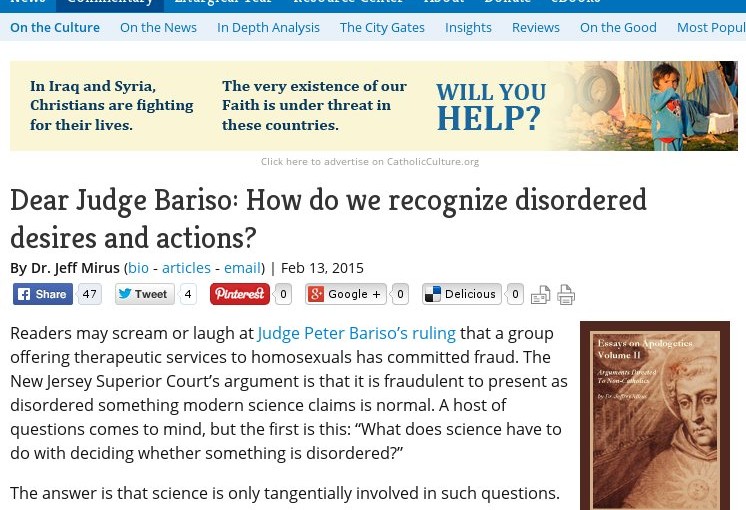We wczorajszych mediach elektronicznych przemknęła wiadomość o tym, że sędzia Superior Court w New Jersey, Peter Bariso, wydał wyrok, w którum uznał, że organizacja o nazwie Jews Offering New Alternatives for Healing (JONAH, Żydzi Oferujacy Nowe Alternatywy Uzdrowienia) popełniła oszustwo (ang. fraud), oferując osobom odczuwającym pociąg do osób tej samej płci terapię pozwalającą na udrowienie. Zdaniem sędziego Bariso:
“It is a misrepresentation in violation of the CFA [Consumer Fraud Act], in advertising or selling conversion therapy services, to describe homosexuality, not as being a normal variation of human sexuality, but as being a mental illness, disease, disorder, or equivalent thereof.”
Jak się okazało, sędzia uznał, że oferowanie leczenia ze skłonności do osób tej samej płci jest naciąganiem, ponieważ:
“The overwhelming weight of scientific authority concludes that homosexuality is not a disorder or abnormal”.
Sttąd był już w jego rozumowaniu tylko krok do następnego stwierdzenia:
“The universal acceptance of that scientific conclusion — save for outliers such as JONAH — requires that any expert opinions to the contrary must be barred. […] the theory that homosexuality is a disorder is not novel but — like the notion that the earth is flat and the sun revolves around it — instead is outdated and refuted. Homosexuality was listed as a mental disorder in the DSM until its removal in 1973. Although the DSM has added newly recognized disorders as a result of evolving understandings of the medical field, this case presents the opposite situation: the APA removed homosexuality from the DSM upon concluding that it was not a disorder.”
Ciśnie się na myśl wiele pytań, np. czy przypadkiem nie ma znaczenia, jak przebiegało uznanie skłonności do osób tej samej płci za normę i czy było dokonane na podstawie metody naukowej oraz czy wciąż jej podlega? na pytanie sformułowane w tytule wpisu próbował sobie na gorąco odpowiedzieć Dr Jeff Mirus (moje wytłuszczenia w tekście):
The answer is that science is only tangentially involved in such questions. It is not scientific study which determines whether something is disordered; it is our human perception of the purposes and ends of things. The human person perceives himself and the world around him as a whole. We are made to discern purposes and ends. We know (by a faculty of soul called “intellect”) that when desires and actions tend toward their real, true or proper ends, they are well-ordered. And when they do not, they are disordered.
We even discern that the entire universe is ordered, a discernment which is immeasurably sharpened and deepened by the Jewish and Christian notions of Providence. In fact, nothing like the Western scientific achievement could have arisen among a people or within a culture that did not have a deep appreciation for the order of the universe. [!!!] This order presupposes predictability, and therefore makes the very concept of the physical sciences possible.
Paradoxically, our contemporary ideology insists that matter is the only reality, that purpose therefore cannot exist, and that random interaction of material particles is the sole cause of everything. Of course, nobody really lives as if this were true, but this intense bias profoundly undermines the scientific method, locking even scientists into a self-contradictory thought process. [Może w tę pułapkę wpaść naukowiec, który nie zgadza się na to, że nie może wytłumaczyć wszystkiego].
For science, as we still understand it today, is impossible unless we posit that there is an order to how things work, and that many things can be fixed (made whole again) if we can understand and alter the factors that may adversely affect that order. Over the centuries, the science guild (like any other) has often blocked new approaches and new developments out of self-interest, but the growing disbelief in order itself may well explain why science is now becoming so broadly politicized. (See Phil Lawler On the News article yesterday, Politicized science: the lessons of the Galileo affair.)
Dalszy ciąg myśli Dr.Mirusa TUTAJ.
